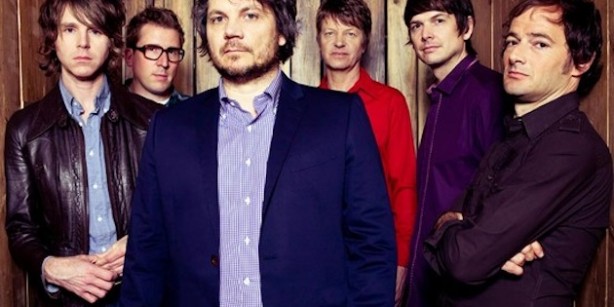 Music
Music
Q & A: Jeff Tweedy talks Wilco's independence, collaborations, and their newfound wholeness
by Nicole Villeneuve
September 27, 2011
Ten years ago, a line was drawn in Wilco‘s career when then-label Reprise Records rejected what would become the band’s most pivotal work, Yankee Hotel Foxtrot. As the well-worn story goes, the Chicago band took the album and ran, and as Yankee Hotel ushered in an experimental new sound and subsequent audience for the band, it also earned them a heap of respect as true and uncompromising artists in a soul-grubbing corporate business.
That album and every since would be released on Nonesuch, but when the contract was up last year, the band started their own label, dBpm, to release new album The Whole Love (out today) and all future Wilco releases. The decade has been defined by the same experimentation, youthful spirit, and unwavering confidence, and though more eyes on the band have inevitably resulted in more crys for Yankee Hotel part two, on this latest, the title sort of gives it away: Wilco sound whole.
Anchored by singer/songwriter Jeff Tweedy, the band remain one of the smartest—and best—in music today. We caught up with Tweedy on the band’s recent tour stop in Toronto to talk about their independence and that wholeness, and the work it took to get there.
AUX: I wanted to first ask you about the label that you started. I’m assuming it’s a bit of both, but I’m curious if it’s more to do with the state of Wilco as a band right now, or the state of the rest of the music industry right now.
Jeff Tweedy: It is a little bit of both. It’s a little bit of how Wilco has developed and nurtured our ability to take on the responsibilities that are traditionally part of a record company’s services. And at the same time, at least some faction of the record industry has not come to terms with the fact that things have changed quite a bit. I think there are a lot of bands coming up that could really utilize all of the different things that a major label can provide, or any label can provide, to help them. But we’ve kind of grown to be able to take care of that for the most part. When our record deal was up, it just didn’t seem like there was going to be any other option. We looked around a little bit, and a lot of traditional record deals were being pitched our way and they just didn’t make any sense.
I feel like I’ve spoken to or noticed quite a few artists lately who are in a similar position in terms of being just out of a contract or something, and it seems like there isn’t a really fair balance between what work a label is doing or a band is doing.
Yeah, that’s exactly it. I don’t think that would be the case for any band that’s just been around for a long time. I think that Wilco has actively pursued a certain amount of self-sufficiency in order to be able to take care of these different things for ourselves, because it just felt better. But yeah, the division of labour is set up—first of all, record contracts have always been skewed against the artist. That’s just the way it is. That’s just the business model that they’ve managed to make work forever. But now, the artist has been empowered quite a bit. The new media distribution has made it a lot easier for a band to manage internally. That changes the equation quite a bit right there.
Wilco seemed to latch on to that idea pretty early on; in the switch between Reprise and Nonesuch, you guys streamed Yankee Hotel Foxtrot before it was released. Do you feel like you had some insight into this shift back then? Or was that just a fluke?
It would be really easy to pat ourselves on the back and say that we did have insight, and we probably did, but I don’t think that what was really steering the ship at that time was any insight, it was a practicality. For us to be able to tour, which is how we make our money, we wanted to be able to play our new songs. And for us to play our new songs and have it be fun for us. A lot of times you just want the audience to be a little bit more aware of what you’re doing. So it was a way for us to get new music out. It wasn’t really a big hit for us financially because at that point we’d never really made any money off of records. Intuition aside, I think it was a good decision based on practicalities.
Looking at the way that cycle’s changed too, we know everything about an album before it’s even out. I remember reading some stuff about The Whole Love along the way that it was going to be a double record.
It is a double record…a double vinyl record.
You can hear its sides. Could you see a younger band not having the same context for making a full album in the way that you do? Or do you think singles and playlists change that at all?
I really don’t think it’s just us because we grew up with records. I think there’s still something pretty appealing about the length of a record as a body of music, as a statement, as an opportunity just for something to have a shape. It’s a nice shape. I do think that there are young people and young bands that still kind of get that and try and make records. But we definitely do, and we did grow up with it as an ideal format to express yourself in musically. Initially we did sort of talk about making two separate records, and then we talked about making a double record. And it is a double record. 30 years ago, there’s no other way it could come out except a double record. And that’s really how we still think of it.
Does that mean there is potentially a ton of unreleased material that you worked on?
There’s a ton of material that was written, and a handful of other material that was worked on. But for the most part, everything that got finished is going to come out in some way.
Something that’s been interesting over the past couple of records is watching this incarnation of the band come into its own. I’m curious how you see the change from when the newest members first joined the band, maybe with the expectation that they were filling a role, as opposed to being part of the cohesive unit that Wilco is now.
I think that The Whole Love as an album, to me, that’s what it really reflects. That everybody that’s in the band now has forgotten not being in the band. And along with that I think everybody feels ownership of Wilco. I think that it took seven years, maybe because everybody came into the band knowing people were already paying attention, and I think we’ve had to kind of shed that, and outgrow that. And every member of the band maybe has had to do it at a different time. The Whole Love sounds to me like the first record where everybody feels full ownership. I think all along, people have done a good job of digging in and being a part of the band and having this chemistry and working together. But I think whatever inhibitions might have been there in the past have fully subsided.
Something that stood out on the record to me was there’s another duet with Leslie Feist, on the title track.
No… Leslie? On “Whole Love”?
That’s not her? It’s definitely her!
That’s probably me. Is the voice really high?…Leslie’s not going to be happy about this. [Laughs]
Okay, you totally almost had me. Well I know you’re coming back to Toronto to do her special, and she was on the last record, and I’ve been curious seeing you work together over the past couple of years how it all came to be, and what the value of that collaborative relationship is to you?
I think it’s just a mutual appreciation. We’ve been friends since I met her at the Grammys a few years ago. She’s been really sweet and generous with her time for us. She’s come and performed with us, and worked on our record. And there’s been a little bit of give and take with, you know, she’ll bounce lyrics off me occasionally, some stuff like that. We’re pals, and that’s always really valuable. I think there’s a real advantage to having friends—and I don’t know how to put this without it sounding weird—but I think it’s really good to have people that have had a lot of success, and who you’re able to share this friendship without there being any jealousies. That’s not to say that you have to be friends only with people that have had a similar type of success, or more success than you’ve had. But I think it does help to be able to let go of all of that. At least for me, I have a certain amount of apprehension that someone’s going to be mad at me, or jealous of me, because of the success I’ve been fortunate to have. The other scenario that’s really fun is working with younger people, and working with people that are just so excited to be around somebody that’s been through some stuff. That’s really fun too.
You’ve collaborated with your sons as well, and put out a single, as the Raccoonists. What was it like to play with and put out a record with them?
It’s almost as fun as playing in Wilco. [Laughs]
Your sons are going to be so sad.
No, I’m just kidding. It’s very very exciting and fun stuff to get to do. They’re just so into it. And it doesn’t have to be anything. There’s not any judgement about whether or not we’re doing something groundbreaking or anything like that. It’s play. Music is play. And I think Wilco, considering all of the pressures and the context that Wilco exists in, that people attach a lot of meaning and importance to, whether or not we believe it’s there, I think at heart we’ve still maintaining focus on the idea that we’re playing. At least I personally want that to be in my life. And with the kids, nothing else is there but that. It’s great.
Are you going to do an album?
There’s a triple album in the works. A triple vinyl. Racccooinista! …Did you get that joke?
Oh yeah, I get the Sandinista! joke.
Okay! Thank you!
And quickly, I wanted to ask about the collecting of footage from fans of their towns that you visit to project at the show on this tour. Why did you want to add that to the show?
There are a lot of reasons that it’s kind of fun for us. One, I think it’s nice to make an audience understand that there’s a collaboration taking place. I think Wilco as a band has done a good job of fostering this sense that we’re collaborating with our audience, and not just using them as consumers. And also I think that when you come to someone else’s town, you are a citizen of that town for however long you’re there, and I think that you should acknowledge that as well.
Tags: Music, Interviews, News, Feist, Jeff Tweedy





